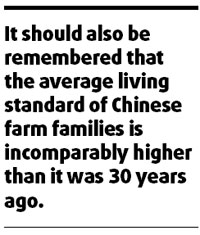Human side of rural change
By Eric Sommer (China Daily)
Updated: 2008-03-04 07:27
Updated: 2008-03-04 07:27
She was born in a small rural village in the Inner Mongolia autonomous region. During her childhood the family was so poor that sometimes they could not even afford rice, and had to live on corn they grew themselves.
Her family home was made of bricks and mud, and had no modern amenities - no heating, no TV, no phone, no indoor toilet, and a power supply that failed frequently.
To maintain the modest household, her mother toiled from dawn to dusk at farm work in the family's fields near the house; her father worked for a small salary as a rural school teacher; and her grandmother, who lived with them, did her best to help care for the young girl.

With difficulty, the family scrapped together the money to send her, and her sister, to the local public school.
Today, everything in the world of the girl's family seems to have magically changed: The family home - still in Inner Mongolia - is now a modern apartment equipped with a big screen TV, DVD player, telephone and a reliable power supply.
Delicious home-cooked meals and eating out in restaurants, are now all part of the family's world.
The father is retired on a teacher's pension, many times larger than the meager salary he received in the 1970s and early 1980s.
As for the young girl who lived on corn during her youth, she went on to secure a university degree with her family's financial help, and lives happily in Beijing.
This story is very close to me - it is the story of my wife Chen Chen. But it is also the story of several hundred million rural Chinese families, who have been lifted out of poverty by China's unique path of development in the past 30 years.
It is often observed - correctly - that there are currently great income disparities between Chinese urban workers and rural farmers.
This problem is all too real, and is now being seriously addressed by government programs like the "project to build a new socialist countryside", which is bringing enhanced medical care, medical insurance, free public schooling, and improved incomes to more than 700 million Chinese farmers.
There is no doubt that city people have benefited relatively more than farmers from China's development. At the same time, it should also be remembered that - in absolute terms - the average living standard of Chinese farm families is incomparably higher than it was 30 years ago, and is now climbing about 6 percent a year.
The author is a Canadian currently teaching in Beijing
(China Daily 03/04/2008 page9)
|
|
|
|
|
|